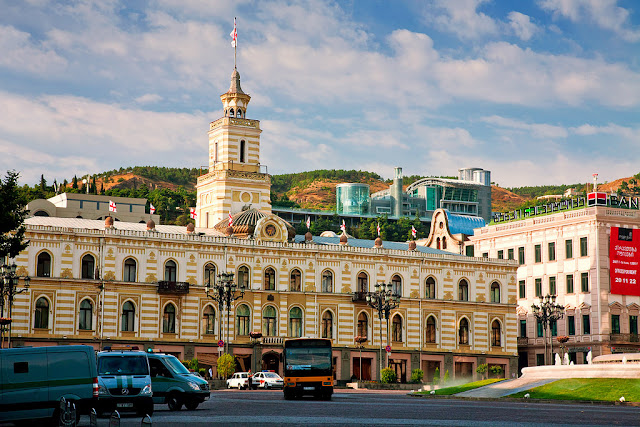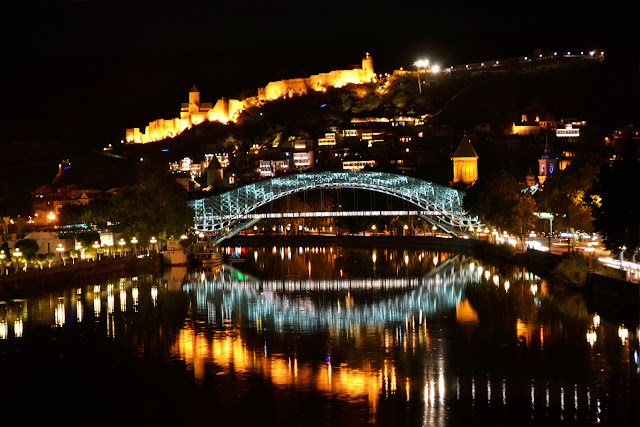About Tbilisi - Capital of Georgia
Tbilisi, Georgia | MBBS IN GEORGIA
TBILISI - OFFICIAL INFORMATION
Tbilisi--One of the Oldest Cities in the World
Tbilisi-Capital of Georgia
Location-Eastern Georgia
Height-380-600 m
Total area- 500 square kilometres.
Population- about 1.5 million
Calling code-32
Climate-moderately warm and humid The coldest month is January, the hottest month is July. The most rainy month is May Average annual temperature is 12,7 °C
National Currency - Georgian Lari
 Tbilisi formerly known as Tiflis, is the capital and the largest city of Georgia, lying on the banks of the Kura River with a population of roughly 1.5 million inhabitants. Founded in the 5th century by the monarch of Georgia's ancient precursor Kingdom of Iberia, Tbilisi has served, with various intervals, as Georgia's capital for more than a thousand years. Under the Russian rule, the city was the seat of the Tsar's viceroy and has served, from 1801 to 1917, as the Imperial capital of the entire Caucasus, including Georgia's current neighbors.
Tbilisi formerly known as Tiflis, is the capital and the largest city of Georgia, lying on the banks of the Kura River with a population of roughly 1.5 million inhabitants. Founded in the 5th century by the monarch of Georgia's ancient precursor Kingdom of Iberia, Tbilisi has served, with various intervals, as Georgia's capital for more than a thousand years. Under the Russian rule, the city was the seat of the Tsar's viceroy and has served, from 1801 to 1917, as the Imperial capital of the entire Caucasus, including Georgia's current neighbors.
Located on the southeastern edge of Europe, Tbilisi's proximity to lucrative east-west trade routes often made the city a point of contention between various rival empires throughout history and the city's location to this day ensures its position as an important transit route for global energy and trade projects. Tbilisi's varied history is reflected in its architecture, which is a mix of medieval, classical, and Soviet structures.
Historically, Tbilisi has been home to people of diverse cultural, ethnic, and religious backgrounds, though it is overwhelmingly Eastern Orthodox Christian. Notable tourist destinations include cathedrals like Sameba and Sioni, classical Freedom Square and Rustaveli Avenue, medieval Narikala Fortress, pseudo-Moorish Opera Theater, and the Georgian National Museum.
The education system of Georgia has undergone sweeping modernizing reforms since 2004. Education in Georgia is mandatory for all children aged 6–14. The school system is divided into elementary (6 years; age level 6–12), basic (3 years; age level 12–15), and secondary (3 years; age level 15–18), or alternatively vocational studies (2 years). Students with a secondary school certificate have access to higher education. Only the students who have passed the Unified National Examinations may enroll in a state-accredited higher education institution, based on ranking of scores he/she received at the exams.
Most of these institutions offer three levels of study: a Bachelor's Program (3–4 years); a Master's Program (2 years), and a Doctoral Program (3 years). There is also a Certified Specialist's Program that represents a single-level higher education program lasting for 3–6 years. As of 2008, 20 higher education institutions are accredited by the Ministry of Education and Science of Georgia. Gross primary enrollment ratio was 94% for the period of 2001–2006.
For more information about Medical education & MBBS in Georgia, Contact us.
Tbilisi State Medical University is ranked 6279 by 4icu.org and 6427 by www.webometrics.info, TSMU became one of the high-ranking state-supported institutions of higher education in the whole Caucasus region.[when?] There are almost 5000 undergraduate and 203 postgraduate students at the University of whom 20% come from foreign countries.[citation needed][which?] Tbilisi State Medical University has undergone Institutional Evaluation Programme, performed by Association of European.
Upon arrival in Tbilisi
Tbilisi International Airport serving various foreign airlines as well as Georgian ones is located about 20 km from the city centre. There are several ways to get to Tbilisi centre from the airport:
1. The most comfortable way is to make arrangement and contact the companies dealing with airport transfer before arrival. That option is more convenient for you, if your flight arrives late at night. Please see more info at Airport-Transfer
2. Also bus #37 transfers passengers from Tbilisi International Airport from 8 a.m. to 8 p.m. It's the cheapest transportation means and just costs 0.5$ but doesn't provide door to door delivery service. However after using that bus you can get to the city center and then change to another public bus and reach any desirable destination.
3. There is the rrailway station near the international airport of Georgia. A very comfortable and modern train with the capacity of 100 passengers will move on the rail road taking them to the central railway station. Traveling from airport to the central railway station will take only 20 minutes and it leaves in every 40 minutes.Fee is only 2 GEL-(about $1.5)
4. Taxi is the best and fastest way to travel. Upon leaving the arrivals terminal, taxi drivers are the first locals you see. Unlike the buses taxi rates are higher and start from 15 Lari (about $10-12) depends on the destination. We strongly recommend you to negotiate the price with the driver beforehand, because they may charge you more instead of the usual rate.
Cultural Hints:
- Handshakes are a common form of greeting, but Georgians often embrace upon meeting with a kiss on the check
- Georgians are friendly and hospitable people who welcome guests and treat them like family.
- Never use bad words while talking to Georgian (no matter what language you speak, offensive words are easily understandable in any language for Georgians :)
- Public displays of affection are generally avoided.
- If you are going to be in Georgia for any length of time, you should not miss one the most typical Georgian experience, the "supra" and its art of toast-making.
The education system of Georgia has undergone sweeping modernizing reforms since 2004. Education in Georgia is mandatory for all children aged 6–14. The school system is divided into elementary (6 years; age level 6–12), basic (3 years; age level 12–15), and secondary (3 years; age level 15–18), or alternatively vocational studies (2 years). Students with a secondary school certificate have access to higher education. Only the students who have passed the Unified National Examinations may enroll in a state-accredited higher education institution, based on ranking of scores he/she received at the exams.
Most of these institutions offer three levels of study: a Bachelor's Program (3–4 years); a Master's Program (2 years), and a Doctoral Program (3 years). There is also a Certified Specialist's Program that represents a single-level higher education program lasting for 3–6 years. As of 2008, 20 higher education institutions are accredited by the Ministry of Education and Science of Georgia. Gross primary enrollment ratio was 94% for the period of 2001–2006.
For more information about Medical education & MBBS in Georgia, Contact us.
Medical Universities In Tbilisi
Tbilisi State Medical University (TSMU) (Georgian: თბილისის სახელმწიფო სამედიცინო უნივერსიტეტი (თსსუ)) is a leading medical university in Tbilisi, Georgia. TSMU was founded as Tbilisi Medical Institute in 1918 and became the Faculty of Medicine within the Tbilisi State University (TSU) in 1930. Tbilisi State Medical Institute was renamed Tbilisi State Medical University in 1992. Since then, the University has operated as an independent educational institution.Tbilisi State Medical University is ranked 6279 by 4icu.org and 6427 by www.webometrics.info, TSMU became one of the high-ranking state-supported institutions of higher education in the whole Caucasus region.[when?] There are almost 5000 undergraduate and 203 postgraduate students at the University of whom 20% come from foreign countries.[citation needed][which?] Tbilisi State Medical University has undergone Institutional Evaluation Programme, performed by Association of European.
Reach Us For MBBS In Georgia - Tbilisi and other Top Medical Universities Abroad
Upon arrival in Tbilisi
Tbilisi International Airport serving various foreign airlines as well as Georgian ones is located about 20 km from the city centre. There are several ways to get to Tbilisi centre from the airport:
1. The most comfortable way is to make arrangement and contact the companies dealing with airport transfer before arrival. That option is more convenient for you, if your flight arrives late at night. Please see more info at Airport-Transfer
2. Also bus #37 transfers passengers from Tbilisi International Airport from 8 a.m. to 8 p.m. It's the cheapest transportation means and just costs 0.5$ but doesn't provide door to door delivery service. However after using that bus you can get to the city center and then change to another public bus and reach any desirable destination.
3. There is the rrailway station near the international airport of Georgia. A very comfortable and modern train with the capacity of 100 passengers will move on the rail road taking them to the central railway station. Traveling from airport to the central railway station will take only 20 minutes and it leaves in every 40 minutes.Fee is only 2 GEL-(about $1.5)
4. Taxi is the best and fastest way to travel. Upon leaving the arrivals terminal, taxi drivers are the first locals you see. Unlike the buses taxi rates are higher and start from 15 Lari (about $10-12) depends on the destination. We strongly recommend you to negotiate the price with the driver beforehand, because they may charge you more instead of the usual rate.
Cultural Hints:
- Handshakes are a common form of greeting, but Georgians often embrace upon meeting with a kiss on the check
- Georgians are friendly and hospitable people who welcome guests and treat them like family.
- Never use bad words while talking to Georgian (no matter what language you speak, offensive words are easily understandable in any language for Georgians :)
- Public displays of affection are generally avoided.
- If you are going to be in Georgia for any length of time, you should not miss one the most typical Georgian experience, the "supra" and its art of toast-making.







Post a Comment